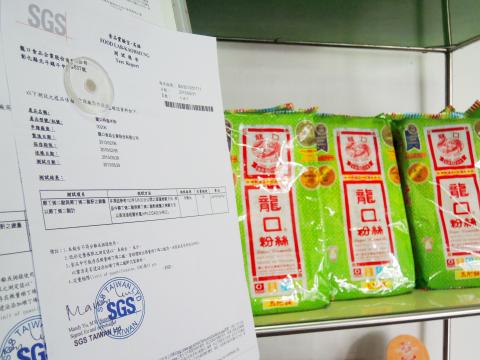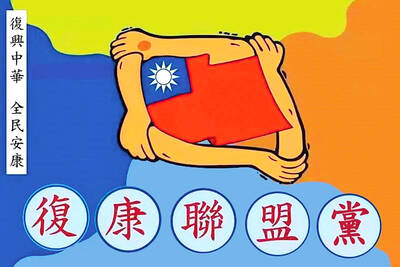Four more starch-based food products from Taiwan have been ordered off the shelves in Singapore after Singaporean authorities said they were found to contain maleic acid.
The products are green tea tapioca balls and yam tapioca balls sold under the “Full Free” label, and Long Kow Foods Enterprise Corp’s (龍口食品) instant vegetarian rice vermicelli (米粉) and rice vermicelli soup (米粉羹), according to a statement issued on Friday by the Agri-Food and Veterinary Authority (AVA) of Singapore.
“AVA informed the importers of the affected products to withdraw them from sale immediately. The withdrawal has been completed,” the statement said.

Photo: Liu Hsiao-hsin, Taipei Times
“Consumers who have bought these products should either return them to the retailer or discard them,” it added.
Earlier last week, 11 Taiwanese products were recalled in Singapore because they alleged contained maleic anhydride-modified starch. Tapioca starch, tapioca pearls, indica rice powder and noodles were among the products recalled.
The AVA said it is continuing to inspect products from Taiwan.
It warned that long-term consumption of high levels of maleic acid can cause kidney damage, although occasional consumption at the levels detected does not pose a significant health risk.
The chemical was recently detected in a number of popular Taiwanese food products, such as rice noodles, hotpot ingredients and tapioca balls.
The substance has been traced to a modified starch containing maleic anhydride, a chemical used in the production of food packing materials. Maleic anhydride transforms into maleic acid when mixed with water. Its use as a food additive is banned in Taiwan.
Long Kow issued a statement on its Web site yesterday, along with test reports issued by certification company SGS Taiwan for the company’s bean vermicelli (冬粉) products and certain food ingredients, to show that its products had passed inspection and did not contain maleic acid.
As for the instant rice vermicelli products found to contain maleic acid in Singapore, the company apologized and said the products had been taken off the shelves.
“To the consumers, we are very sorry. Our company has sent this product series to labs for inspection, and we have requested all major supermarkets to take them off the shelves,” the statement said, adding that the company is willing to refund consumers.
The company said that the rice vermicelli products were made by an outside contractor, a large Taiwanese rice vermicelli manufacturer.
The ingredients in the product’s condiment pouch were also produced by an outside contractor, a large food manufacturer in Yunlin County, it said.
These two contractors are well-established food manufacturers and both have provided reports which purportedly show the ingredients used do not contain maleic acid, the company said, adding that it was surprised by the Singaporean authority’s findings.
In response to media queries about the latest recall of Taiwanese products in Singapore, Food and Drug Administration Director-General Kang Jaw-jou (康照洲) said the first step was to confirm whether the manufacturers of the food products in question in Singapore were the same as the domestic manufacturers.
“The second step is to check the batch numbers and manufacturing dates of the exported products. The authority will then examine whether the products made and raw materials used by the manufacturers in Taiwan are up to standard,” Kang said.
Additional reporting by Alison Hsiao

AIR DEFENSE: The Norwegian missile system has proved highly effective in Ukraine in its war against Russia, and the US has recommended it for Taiwan, an expert said The Norwegian Advanced Surface-to-Air Missile Systems (NASAMS) Taiwan ordered from the US would be installed in strategically important positions in Taipei and New Taipei City to guard the region, the Ministry of National Defense said in statement yesterday. The air defense system would be deployed in Taipei’s Songshan District (松山) and New Taipei City’s Tamsui District (淡水), the ministry said, adding that the systems could be delivered as soon as the end of this year. The US Defense Security Cooperation Agency has previously said that three NASAMS would be sold to Taiwan. The weapons are part of the 17th US arms sale to

SERIOUS ALLEGATIONS: The suspects formed spy networks and paramilitary groups to kill government officials during a possible Chinese invasion, prosecutors said Prosecutors have indicted seven retired military officers, members of the Rehabilitation Alliance Party, for allegedly obtaining funds from China, and forming paramilitary groups and assassination squads in Taiwan to collaborate with Chinese troops in a possible war. The suspects contravened the National Security Act (國家安全法) by taking photos and drawing maps of key radar stations, missile installations and the American Institute in Taiwan’s headquarters in Taipei, prosecutors said. They allegedly prepared to collaborate with China during a possible invasion of Taiwan, prosecutors said. Retired military officer Chu Hung-i (屈宏義), 62, a Republic of China Army Academy graduate, went to China

INSURRECTION: The NSB said it found evidence the CCP was seeking snipers in Taiwan to target members of the military and foreign organizations in the event of an invasion The number of Chinese spies prosecuted in Taiwan has grown threefold over a four-year period, the National Security Bureau (NSB) said in a report released yesterday. In 2021 and 2022, 16 and 10 spies were prosecuted respectively, but that number grew to 64 last year, it said, adding that the Chinese Communist Party (CCP) was working with gangs in Taiwan to develop a network of armed spies. Spies in Taiwan have on behalf of the CCP used a variety of channels and methods to infiltrate all sectors of the country, and recruited Taiwanese to cooperate in developing organizations and obtaining sensitive information

BREAKTHROUGH: The US is making chips on par in yield and quality with Taiwan, despite people saying that it could not happen, the official said Taiwan Semiconductor Manufacturing Co (TSMC, 台積電) has begun producing advanced 4-nanometer (nm) chips for US customers in Arizona, US Secretary of Commerce Gina Raimondo said, a milestone in the semiconductor efforts of the administration of US President Joe Biden. In November last year, the commerce department finalized a US$6.6 billion grant to TSMC’s US unit for semiconductor production in Phoenix, Arizona. “For the first time ever in our country’s history, we are making leading edge 4-nanometer chips on American soil, American workers — on par in yield and quality with Taiwan,” Raimondo said, adding that production had begun in recent